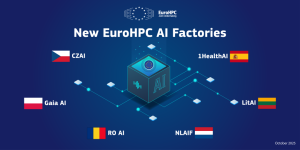The European Commission has unveiled the next phase in Europe’s artificial intelligence strategy with the launch of six new AI Factories across the continent.
This latest expansion brings the total network to 19 AI Factories spanning 16 EU Member States, reinforcing Europe’s position as a global leader in digital innovation and AI sovereignty.
The new facilities – located in Czechia, Lithuania, the Netherlands, Romania, Spain, and Poland – will serve as powerful engines for research, innovation, and industrial adoption of AI.
Backed by €500m in joint investment from the EU and national governments, the initiative will give startups, SMEs, and researchers direct access to AI-optimised supercomputers, training, and technical expertise.
Together, these investments represent a broader €2.6bn commitment to the AI Factories and Antennas Initiative, part of the European Commission’s drive to create a digitally sovereign ‘AI Continent.’
Building the backbone of Europe’s AI infrastructure
Each AI Factory acts as a national one-stop shop for businesses and researchers developing advanced AI models.
They offer access to high-performance computing (HPC) resources optimised for AI workloads, along with data storage, accelerator technologies, and hands-on innovation support.

Beyond providing compute power, the AI Factories are designed to bridge the gap between research and application, enabling European companies to design, test, and deploy AI solutions in critical sectors such as healthcare, cybersecurity, green energy, smart industry, and agriculture.
The initiative also complements the upcoming AI Factory Antennas, which will allow national AI communities to access these world-class supercomputing systems remotely. Together, these networks will create a fully interconnected European AI infrastructure.
Czechia’s CZAI: Linking research and real-world AI
In Czechia, the Czech AI Factory (CZAI) will play a central role in advancing applied AI research. Built on the EuroHPC Karolina supercomputer infrastructure, the upgraded KarolAIna system is specifically designed for AI workloads.
Operated by IT4Innovations National Supercomputing Center, CZAI will focus on practical applications, industry collaboration, and AI skills development, ensuring Czechia remains deeply integrated within the European AI ecosystem.
Lithuania’s LitAI Factory: Driving sovereign AI innovation
The LitAI Factory in Lithuania aims to transform the country’s computing infrastructure into a fully AI-optimised ecosystem.
Led by Vilnius University and hosted at the LRTC VDC3 data centre, it will provide end-to-end AI support – from supercomputing and storage to data acceleration and innovation advisory services.
Prioritising sectors such as cybersecurity, green energy, smart industry, and digital health, LitAI will also collaborate closely with Polish and broader EU initiatives, ensuring Lithuania becomes an active contributor to Europe’s AI-driven growth.
The Netherlands’ NLAIF: Turning research into scalable solutions
The Dutch AI Factory (NLAIF) will bridge the gap between groundbreaking AI research and real-world deployment.
With a new AI-optimised supercomputer at its core, NLAIF will provide customised AI compute capacity on a secure, scalable infrastructure that complies with EU data regulations.
This Factory will focus particularly on sensitive data applications, including healthcare, intellectual property, and public safety.
By supporting sectors like healthcare, agriculture, and security, NLAIF aims to accelerate the responsible and open adoption of AI technologies across Europe.
Poland’s Gaia AI Factory: Building skills and scale
In Poland, the Gaia AI Factory will act as a hub for developing cutting-edge AI technologies and strengthening national expertise.
Operated by Cyfronet AGH under the PLGrid framework, Gaia will expand infrastructure, improve access to large-scale data repositories, and deliver comprehensive training programmes for entrepreneurs, researchers, and students.
Targeting fields such as healthcare, space technology, and large language models (LLMs), the Polish Factory will cultivate the next generation of AI talent and foster cross-border collaboration within the European network.
Romania’s RO AI Factory: Empowering SMEs for AI innovation
Romania’s RO AI Factory is focused on turning small and medium-sized enterprises (SMEs) from technology adopters into AI innovators.
Its new AI-optimised supercomputer will provide a suite of services including HPC access, model development support, data hosting, and libraries of trustworthy AI algorithms.
By combining infrastructure with capacity-building programmes, the RO AI Factory aims to help a diverse range of businesses and public institutions harness AI responsibly and effectively.
Spain’s 1HealthAI: A European leader in One-Health research
Spain’s 1HealthAI Factory is poised to make Europe a world leader in One-Health AI – integrating human, animal, and environmental health.
Equipped with an experimental platform for testing and developing AI models, 1HealthAI will enable researchers and industries to build trustworthy AI solutions that improve health outcomes and sustainability across Europe.
A milestone in Europe’s AI continent vision
The European Commission’s latest expansion marks a significant step toward establishing AI Factories as the foundation of Europe’s digital future.
By connecting 19 AI hubs across 16 countries, Europe is creating a unified ecosystem that combines technical sovereignty, innovation capacity, and ethical AI development.
These AI Factories not only strengthen Europe’s high-performance computing capabilities but also ensure that AI solutions are conceived, tested, and scaled within a secure and sovereign European framework – accelerating the continent’s journey toward becoming the world’s leading AI powerhouse.
